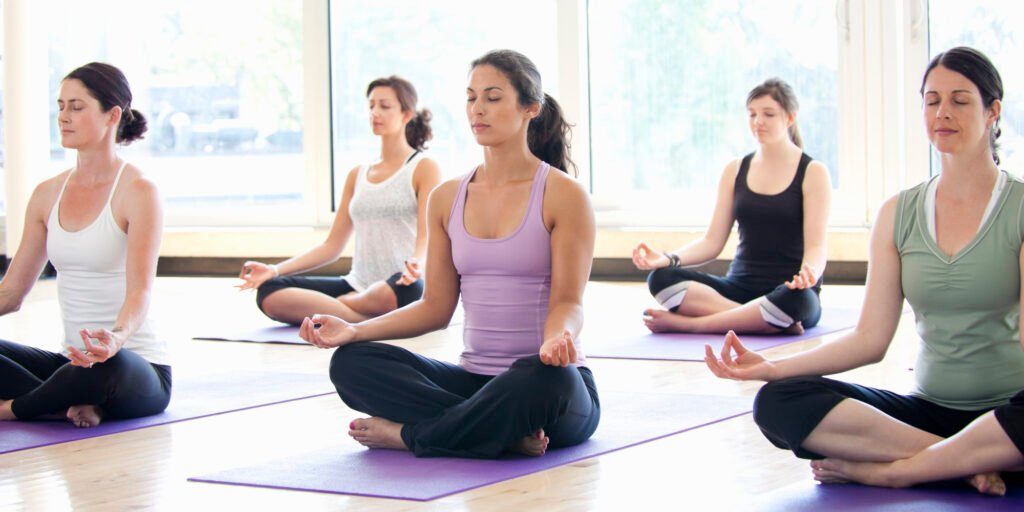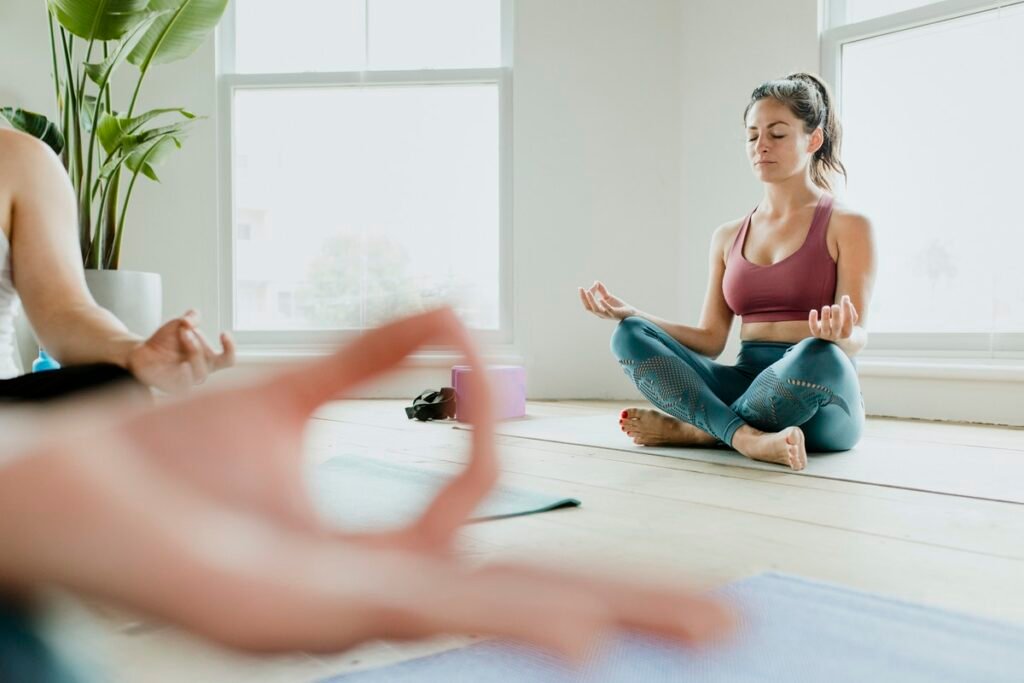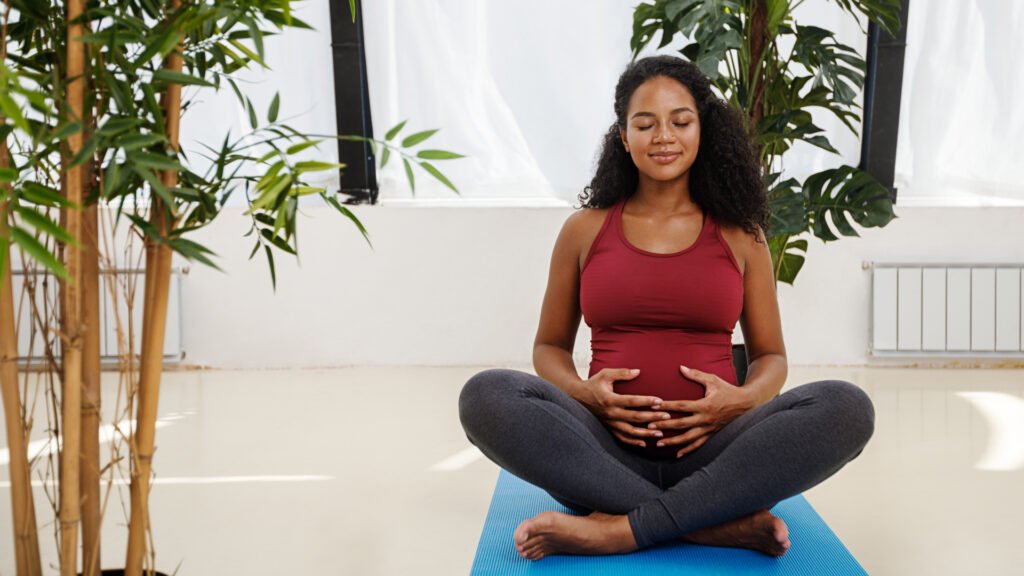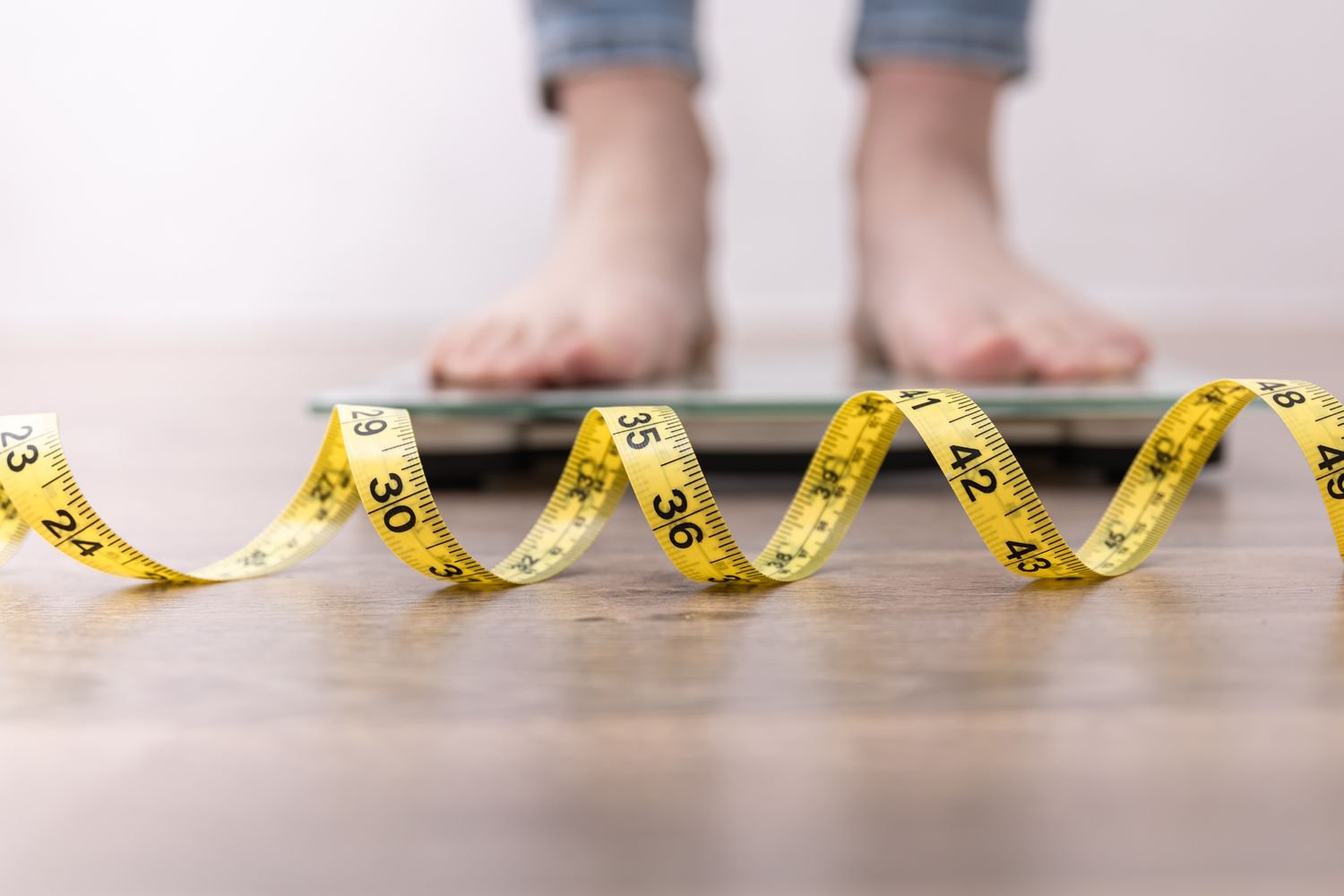Table of Contents
The Benefits of Yoga for Women’s Health and Well-being
Yoga has become an increasingly popular practice for women of all ages, and for good reason. This holistic approach to fitness and wellness offers numerous benefits that extend beyond physical health to enhance mental clarity and emotional well-being. Whether you are looking to improve flexibility, reduce stress, or increase physical strength, yoga provides a well-rounded solution. In this article, we’ll explore the diverse benefits yoga offers for women, including its positive effects on physical strength, flexibility, mental health, and overall quality of life.
Yoga is more than just a workout – it’s a way of life that can support a woman’s well-being on multiple levels. Whether you’re a beginner or an experienced practitioner, yoga can offer something for everyone. From reducing anxiety to increasing energy levels, yoga is a powerful tool that can improve both your mind and body. Let’s dive deeper into how yoga can be a game-changer for women’s physical and mental health.
How Yoga Improves Physical Strength and Flexibility
Building Core Strength: Why It Matters
Yoga helps strengthen the core muscles, which are essential for maintaining posture and supporting the spine. The importance of core strength goes beyond aesthetics – a strong core helps stabilize the body during everyday movements. In addition to improving posture, core strength plays a key role in reducing the risk of injuries, especially in the lower back and pelvis. Some of the most effective yoga poses for building core strength include planks, boat pose, and warrior poses. These poses engage the entire abdominal region, enhancing balance and stability.
Core strength also plays a crucial role in supporting the pelvic region, which is particularly important for women’s health. For example, strengthening the pelvic floor muscles through yoga can improve bladder control and sexual health. During pregnancy and postpartum recovery, women’s pelvic muscles undergo significant changes, and core strengthening exercises in yoga can aid in strengthening these muscles, improving overall pelvic health. Additionally, women often experience low back pain or discomfort in the abdominal area due to factors like pregnancy, menopause, or prolonged sitting. Yoga can reduce this pain by improving core stability and posture, making daily activities easier and more comfortable.
A strong core provides numerous benefits, not only preventing injury but also supporting overall athletic performance. Whether you are running, cycling, or engaging in other physical activities, a strong core is fundamental for better efficiency and less strain. A focus on core strength in yoga also helps enhance your posture, which tends to decline with age or during prolonged periods of sitting or standing.
Increasing Flexibility: Stretching Your Limits

Yoga is renowned for its ability to improve flexibility, which is particularly beneficial for women who may experience muscle stiffness or tightness due to long hours of sitting, poor posture, or lack of movement. Increased flexibility enhances your range of motion and reduces the stiffness that comes with modern sedentary lifestyles. Flexibility is key to performing daily tasks with ease and comfort, whether it’s bending down to tie your shoes, reaching for items on a high shelf, or maintaining proper posture while standing or sitting.
Incorporating yoga into your routine can help stretch and lengthen muscles, improving flexibility in areas like the hips, spine, shoulders, and hamstrings. For women who may suffer from lower back pain, hip tightness, or poor posture due to prolonged sitting, yoga offers relief. Poses like the downward dog, forward fold, and hip-opening stretches help release tension in these key areas.
Increased flexibility not only helps reduce muscle tightness and pain, but it also improves joint health. Joint health becomes increasingly important as we age, and yoga helps keep joints lubricated and mobile, lowering the risk of arthritis and other joint-related issues. As women age, they may experience changes in flexibility due to hormonal shifts and decreased muscle mass. Yoga helps counteract these changes, providing a consistent way to maintain and improve flexibility over the years.
Flexibility gained through yoga also supports better circulation and blood flow, reducing the risks associated with muscle tightness such as spasms and injuries. Yoga poses that emphasize deep stretches and full-range movements can help increase the range of motion in the joints and muscles, significantly improving mobility and overall health.
Enhancing Bone Health: A Natural Way to Strengthen Bones

One of the most important benefits of yoga for women is its ability to enhance bone health. Osteoporosis, a condition characterized by weakened bones and increased risk of fractures, is a major concern for women, particularly post-menopause. Studies have shown that regular yoga practice can help prevent bone loss and even improve bone density in older women. Weight-bearing and strength-building movements, such as downward dog, tree pose, and various squat variations, can stimulate bone growth and help maintain bone density.
Regular yoga practice not only promotes bone health but also improves balance, which is essential for preventing falls and injuries. Many yoga poses focus on strengthening the legs, spine, and core muscles, providing the stability necessary to avoid falls – a significant risk for women with osteoporosis. The incorporation of balance poses, such as warrior pose and tree pose, helps strengthen the muscles around the bones, reducing the likelihood of fractures.
Maintaining bone health through yoga is especially beneficial for women after menopause, as estrogen levels decline, increasing the risk of osteoporosis. Yoga provides a natural way to safeguard bone density without the need for medications that may carry side effects. Research has shown that weight-bearing exercises, like yoga, can significantly reduce bone loss and even increase bone density in older women.
For more information on bone health and osteoporosis prevention, check out this article on Osteoporosis: Symptoms, Causes, and Treatment from WebMD.
Mental Health Benefits of Yoga for Women

Reducing Stress and Anxiety: Calming the Mind
One of the most well-known benefits of yoga is its ability to reduce stress and promote relaxation. Yoga encourages deep, controlled breathing and mindfulness, which helps activate the parasympathetic nervous system, also known as the “rest and digest” system. This response counteracts the “fight or flight” response triggered by stress, leading to an immediate sense of calm.
Breathing exercises, known as pranayama, are central to many yoga practices and help women reduce anxiety and mental tension. Studies have shown that practicing yoga can lower cortisol levels (the stress hormone) in the body, helping women feel more relaxed and in control of their emotions. A reduction in stress levels can lead to better sleep, a clearer mind, and an overall sense of well-being.
Yoga’s focus on meditation, combined with physical movements, helps quiet the mind, relieving the mental clutter that many women face daily. The holistic approach of yoga enables women to address the root cause of stress, teaching them to be more mindful in their daily lives. The techniques learned on the mat can often be applied off the mat, providing coping mechanisms that last beyond the practice itself.
For more details on how yoga can improve mental health, check out Healthline’s insights on stress reduction through yoga. Additionally, integrating healthy habits, such as yoga, into your lifestyle can be beneficial for weight loss and overall health. If you’re interested in learning more about how healthy habits contribute to weight loss, visit The Truth About Weight Loss: Healthy Habits Work.
Boosting Mental Clarity and Focus: Sharpening Your Mind
In today’s fast-paced world, mental clarity and focus are increasingly difficult to maintain. Yoga is a powerful tool for improving cognitive function, enhancing mental clarity, and increasing focus. By combining controlled breathing with mindful movement, yoga helps women reconnect with their bodies and quiet their minds. This mind-body connection promotes greater mental clarity, improving concentration and cognitive function.
Women who practice yoga regularly often report feeling more present and able to concentrate better on tasks at hand. Whether at work, home, or in social settings, yoga helps reduce distractions and encourages mental focus. In addition, the mindfulness learned through yoga can help women become more self-aware, which improves decision-making and emotional regulation.
Yoga’s ability to boost mental clarity is not just limited to the yoga mat. Many women find that the mental benefits of yoga extend into their daily lives, making it easier to stay organized, prioritize tasks, and manage stress. Yoga encourages a calm and focused mindset, leading to increased productivity, clearer thinking, and more effective problem-solving.
Improving Emotional Well-being: Healing from Within
Yoga is not only about physical exercise – it’s also a powerful tool for improving emotional health. The meditative aspects of yoga promote self-awareness, emotional healing, and personal growth. Many women use yoga to process emotions, confront stress, and develop greater emotional resilience. Through yoga, women learn to acknowledge their feelings without judgment, fostering a sense of inner peace and balance.
For women dealing with anxiety, depression, or low self-esteem, yoga provides a natural and non-invasive way to improve emotional well-being. The regular practice of yoga can help reduce the intensity of negative emotions, such as sadness, anger, or fear, by promoting relaxation and mindfulness. Additionally, yoga encourages women to cultivate compassion for themselves, which can help break the cycle of negative thought patterns that contribute to poor emotional health.
Regular yoga practice promotes emotional balance, helping women feel more grounded and centered. By increasing emotional resilience, yoga enables women to navigate life’s ups and downs with greater ease and less emotional strain. This emotional stability can have a positive impact on relationships, work life, and overall well-being.
Yoga for Women of All Ages
Yoga is an accessible practice for women of all ages and fitness levels. Whether you are in your 20s or in your 70s, yoga offers benefits that can support your overall health and well-being. As women age, yoga can help improve strength, flexibility, and emotional balance while reducing the risk of common age-related conditions.
Yoga During Pregnancy: Enhancing Health for Expecting Mothers

Pregnancy is a time of significant physical and emotional change. Prenatal yoga is specifically designed to support women during this transformative period. Yoga helps alleviate common pregnancy discomforts such as back pain, fatigue, and swelling, while also promoting relaxation and reducing stress.
Prenatal yoga encourages deep breathing and mindfulness, which can help expectant mothers feel more connected to their bodies and their babies. Certain yoga poses, such as cat-cow, child’s pose, and wide-legged forward fold, are safe and effective for pregnant women, improving flexibility and strengthening the pelvic floor muscles in preparation for childbirth.
Additionally, prenatal yoga can help prepare the body for labor by improving stamina, flexibility, and mental focus. Yoga provides a safe and holistic way for women to maintain physical health, reduce discomfort, and manage the emotional challenges that can arise during pregnancy.
For further insights into yoga during pregnancy, you can check out WebMD’s guide on Prenatal Yoga.
Yoga for Menopausal Women: Easing the Transition
Menopause is a major life transition that brings its own set of challenges, including hormonal fluctuations, mood swings, and a decline in bone density. Yoga can be an invaluable tool for women navigating this stage of life. It helps manage menopausal symptoms, promotes emotional well-being, and improves overall health.
Yoga poses that engage weight-bearing movements, such as warrior pose and tree pose, help maintain bone strength and prevent osteoporosis. Additionally, breathing exercises can alleviate hot flashes and improve sleep quality. Yoga also offers relief from mood swings and anxiety, which are common during menopause.
Through regular practice, yoga can help women find emotional balance and adapt to the changes that come with menopause. The focus on mindfulness, relaxation, and self-compassion can provide a sense of empowerment and support women through this significant life stage.
Conclusion: Embrace Yoga for a Healthier, Happier Life
Yoga offers women a holistic approach to physical and mental health. From increasing strength and flexibility to reducing stress and enhancing emotional well-being, yoga can have a transformative impact on all aspects of a woman’s life. Whether you’re new to yoga or an experienced practitioner, yoga provides something for everyone, offering benefits at any age and fitness level.
By incorporating yoga into your routine, you can achieve a greater sense of balance, improve physical health, and foster emotional well-being. If you’re looking for a holistic and sustainable way to improve your health, reduce stress, and connect with your body, yoga is the perfect solution. Additionally, if you’re interested in understanding how yoga can support hormonal balance and overall wellness, check out this guide on PCOS: Understanding Symptoms & Effective Treatment, which highlights holistic approaches to managing health.
Explore more articles on women’s health and wellness, or leave a comment below to share your experiences with yoga. We’d love to hear from you!
Frequently Asked Questions (FAQs)
1. How often should women practice yoga to see benefits?
Women should aim to practice yoga at least 2-3 times per week to see significant benefits. Consistency is key, as regular practice improves strength, flexibility, and mental well-being.
2. Can yoga help with weight loss?
Yes, yoga can aid in weight loss by reducing stress, promoting mindfulness, and increasing body awareness. While it may not burn as many calories as high-intensity workouts, yoga can complement other exercises and contribute to a balanced lifestyle.
3. Is yoga safe for beginners?
Yoga is generally safe for beginners and can be adapted to suit various fitness levels. Beginners should start with gentle classes such as Hatha yoga or Vinyasa yoga, gradually increasing intensity as they become more comfortable.
4. How can yoga help with stress and anxiety?
Yoga is known for its ability to reduce stress and anxiety by promoting relaxation and mindfulness. Breathing exercises (pranayama) and meditation activate the parasympathetic nervous system, helping to lower cortisol levels and reduce stress.
5. Can yoga improve flexibility in older women?
Yes, yoga is particularly beneficial for older women, as it improves flexibility and joint mobility. Regular practice helps maintain muscle tone and range of motion, preventing stiffness and reducing the risk of injury.




Pingback: The Benefits of Regular Health Screenings for Women